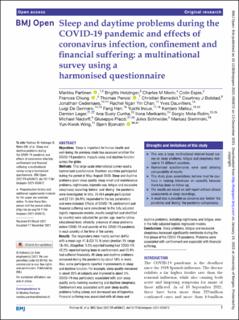Sleep and daytime problems during the COVID-19 pandemic and effects of coronavirus infection, confinement and financial suffering: a multinational survey using a harmonised questionnaire
Partinen, Markku; Holzinger, Brigitte; Morin, Charles M; Espie, Colin A.; Chung, F.; Penzel, Thomas; Benedict, Christian; Bolstad, Courtney J.; Cedernaes, Jonathan; Chan, Rachel Ngan Yin; Dauvilliers, Yves; De Gennaro, Luigi; Han, Fang; Inoue, Yuichi; Matsui, Kentaro; Leger, Damien; Cunha, Ana Suely; Merikanto, Ilona; Mota-Rolim, Sergio; Nadorff, Michael; Plazzi, Giuseppe; Schneider, Jules; Sieminski, Mariusz; Wing, Yun-Kwok; Bjorvatn, Bjørn
Journal article, Peer reviewed
Published version

Åpne
Permanent lenke
https://hdl.handle.net/11250/2976019Utgivelsesdato
2021Metadata
Vis full innførselSamlinger
Sammendrag
Objectives
Sleep is important for human health and well-being. No previous study has assessed whether the COVID-19 pandemic impacts sleep and daytime function across the globe.
Methods
This large-scale international survey used a harmonised questionnaire. Fourteen countries participated during the period of May–August 2020. Sleep and daytime problems (poor sleep quality, sleep onset and maintenance problems, nightmares, hypnotic use, fatigue and excessive sleepiness) occurring ‘before’ and ‘during’ the pandemic were investigated. In total, 25 484 people participated and 22 151 (86.9%) responded to the key parameters and were included. Effects of COVID-19, confinement and financial suffering were considered. In the fully adjusted logistic regression models, results (weighted and stratified by country) were adjusted for gender, age, marital status, educational level, ethnicity, presence of sleep problems before COVID-19 and severity of the COVID-19 pandemic in each country at the time of the survey.
Results
The responders were mostly women (64%) with a mean age 41.8 (SD 15.9) years (median 39, range 18–95). Altogether, 3.0% reported having had COVID-19; 42.2% reported having been in confinement; and 55.9% had suffered financially. All sleep and daytime problems worsened during the pandemic by about 10% or more. Also, some participants reported improvements in sleep and daytime function. For example, sleep quality worsened in about 20% of subjects and improved in about 5%. COVID-19 was particularly associated with poor sleep quality, early morning awakening and daytime sleepiness. Confinement was associated with poor sleep quality, problems falling asleep and decreased use of hypnotics. Financial suffering was associated with all sleep and daytime problems, including nightmares and fatigue, even in the fully adjusted logistic regression models.
Conclusions
Sleep problems, fatigue and excessive sleepiness increased significantly worldwide during the first phase of the COVID-19 pandemic. Problems were associated with confinement and especially with financial suffering.
